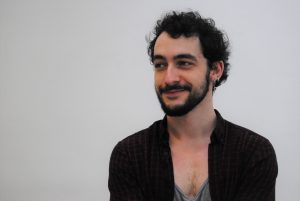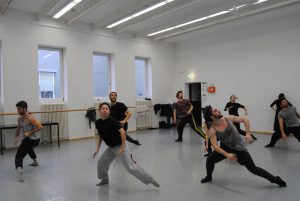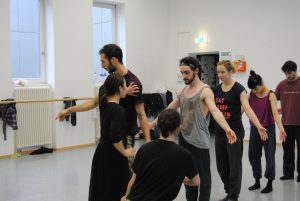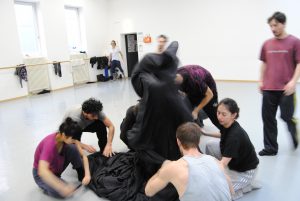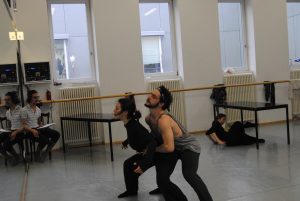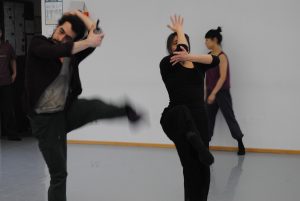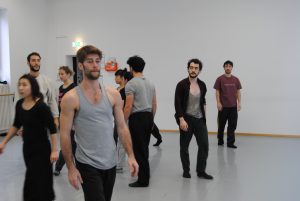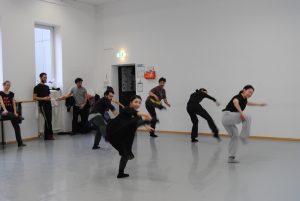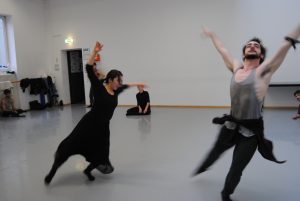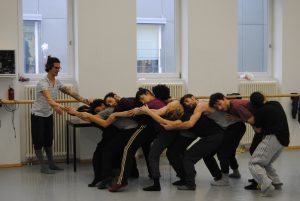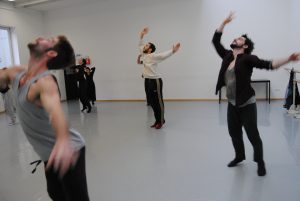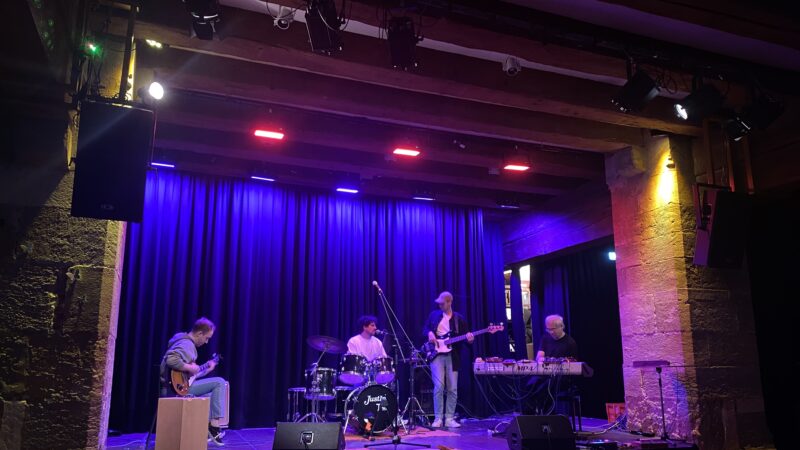Leben, um zu tanzen! – Teil II
»You are basically free to do anything you want to do« – Tomasso Quartanti über Contemporary Dance und Licht- und Schattenseiten einer Karriere als professioneller Tänzer.
Im zweiten Teil der Serie »Leben, um zu tanzen« spricht Anika Schiller mit Tomasso Quartani (25), der als Tänzer beim Theater Regensburg arbeitet. Seit er acht Jahre alt ist, tanzt Tomasso Modern Dance, Contemporary und Ballett. Bereits im Alter von 12 Jahren hat er sich für eine Karriere als professioneller Tänzer entschieden. Im Interview spricht er darüber, was es bedeutet, jeden Tag schwitzend und halb nackt in einem Tanzstudio zu stehen, über seine Pläne nach der Karriere als Tänzer und was Tanzen mit Kritikfähigkeit zu tun hat.
In unserer Serie »Leben, um zu tanzen«, lassen wir leidenschaftliche Tänzer oder Tänzerinnen zu Wort kommen. Vielleicht fühlt sich ja der eine oder andere Leser inspiriert. Für den Fall haben wir euch am Ende des Interviews praktische Links zusammengestellt. Außerdem durfte Anika exklusiv für die Lautschrift an einer Probe für das aktuelle Stück »Der Tod und das Mädchen« teilnehmen. Die Fotos davon sind in der Bildergalerie zu finden. Das Interview ist dieses Mal auf Englisch, weil Tomasso, der ursprünglich aus Italien kommt, sich noch nicht so sicher in Deutsch fühlt.
Dear Tomasso, thanks for letting me do this interview with you. You are a professional dancer, what does dancing mean for you personally? And what do you like especially about Contemporary Dance?
Have you ever tried meditating? I’m not able to meditate, it is too hard for me. But what happens when you are meditating is what happens whenever you are focused on something 100 percent. Time flows differently for you. You enter this kind of meditation state of mind. That’s what happens when I’m dancing. And somehow you also start to appreciate the physical effort, like the fatigue, the tiredness. It just feels right. But now that I’m thinking, I have been doing this for a huge part of my life. It is very hard to picture a life without it. It has been such a long time that it is already part of my identity.
And in contemporary dance I like the freedom of expression. You can think and do whatever you have in mind. It gives you the chance to use your body as a tool to deliver a meaning. And no one can tell me what is right or wrong, only whether it was effective. You have either received the message and react to it, or not.
Can you please explain the meaning of Contemporary Dance a bit more?
Contemporary includes a lot of elements from theater and other styles of dance. It is hard to describe, because it could be anything. When you see it, you know what it is. There is no fixed position or movement like there is in ballet. You are basically free to do anything you want to do, to play with the rhythm, coordination, timing. It started with Modern Dance, then Contemporary went more experimental.
And how did you end up becoming a professional dancer?
You know, you start doing something for a long, long time, and teachers and people always push you to do more and more, until you reach the point where you ask yourself: Am I doing this for something more than just for fun? Actually the very important decisions for a dancer and for his career are made very early in his life as you need to start very well very early.
At what age?
Normally, if you are aspired to become a good professional dancer, by the age of eleven or, 12 you should already be studying every day of the week. Because the earlier you do so, the better it is. Our body, when we are younger, is more flexible, easier to form. Once – right now for me– it already gets harder to get away from my style, from what I am used to do, because after all these years you have your own way of moving and you are less flexible to changes.
But having your own style is also part of the art, isn’t it? Why is it so important to be that flexible and adapt to new forms?
Let’s put it this way: For a painter it is his brush. Different kinds of brushes, different thickness and so on. We only have our body. That’s our tool. Therefore we need to keep it sharp, we need to keep it fit. And from my personal point of view, the more different styles and techniques you are able to do, the better chances you have to be able to express whatever you want to express.
Is dancing also damaging your body?
Yes, yes it is. The tissues, the spine, the hips are getting consumed and I feel it because it’s painful. I mean, you reach old age pretty fit, but the articulations are a bit problematic. It is ok. We also learn how to work in pain. Especially when you are young, you feel like you have no time to waste. You need to do more stuff, you need to be the best, you need to always be there and do as much stuff as you can, even when you are in pain. I mean, it is not the right attitude. But it is something that is always happening. I have seen so many dancers working in pain.
You have decided to become a dancer at the age of ten or eleven. Can anyone just do that, or do you need special traits or something like that? What is important?
I cannot think of any specific requisite you need to become a dancer. It is something you just discover on the way. And what’s actually good about Contemporary is, that there is no specific body type you should have. In ballet you need a very specific shape of body, length of the leg, small breasts. In ballet having big breasts is usually not good for girls. A lot of girls I know were studying in a ballet academy in my hometown. Two or three of them are working as freelance dancers right now. But the other 20 all dropped out. Not only but also because of their body shape.
Quite hard, that is something you cannot choose.
Well, it is similar to for example a musician who needs the right predisposition to understand music. In our case it is physical predisposition to do something. So yeah, it feels unfair, because you cannot control it. But in the same way, I cannot control the way in which I understand Mathematics. You wouldn’t say it is unfair that I cannot become a Mathematician because I don’t understand Mathematics. I guess, it is hard to get this, because it’s about the body and you feel judged and criticized. Actually, dance is a lot about criticizing. So, it is hard to accept it, when you want to be a dancer.
Why is dance a lot about criticism?
Well, what we basically get since the moment we start learning and studying and working, is corrections. How you do things, if it’s right, if it’s wrong, you could do it like this, you could do it like that. It is basically a whole continuous criticism. And you need to learn very early that it is not a personal thing. It is something that is supposed to help you to improve. But yeah, there will always be someone next to you judging what you are doing. Not because he is judging you as a person or as an artist, it’s because you are together trying to reach something.
You said, your body now already is less flexible. You probably will not be able to work as a dancer forever. Do you already have any plans for the time after your dancing career?
Tricky question, because it is actually now that I start asking myself this question. When you turn40 it about starts to get time to stop, because some physical things are not possible for you to do anymore. I already have pain in my hips now. It starts early… about 15 years from now I will have to make a decision and I have already started to figure out what to do. I would like to become an assistant. This is the person in contact with the choreographer, giving the corrections to the dancers, holding the rehearsals. Basically the guy who makes everything else that needs to be done for a dancing company.
Wow, kind of hard to imagine. We are nearly the same age and I start looking for my first job and you are already planning the career after your career… Did you miss out on many things or had to give up something for realizing your dream to become a dancer?
When I was 13 years old my teachers started talking about sending me somewhere else, to a bigger academy, even abroad. When I was 16, I moved to Florence, because there is a pretty good dance academy. I was taking care of myself and my flat, going to school, and going to three or four dance classes a day. I don’t remember a lot of things during this time. I was so busy.
You sacrifice a great portion of your youth and teenage years.I was doing my »university« as a dancer while I was still at high school. And taking dance classes costs money. So when all my friends started to go to university I was already working. My last year of high school I did privately without going to school, just studying by myself, so that I would have enough time to work and practice. And every weekend it was – not forbidden – , but tricky for me to go out and party, because the morning after I would have rehearsal or I would need to work or something else. I had to give up a lot of interests, because dancing takes a lot of time if you want to do it for a living.
I can’t really imagine a life like that at the age of 16. You have this straight plan, every morning you get up at six, you go to school, go to work, to dance classes. When was your rebel time or your puberty? Weren’t you interested in girls?
Ok, well, well, well. I mean, it was hard work, but it was also a lot of fun. You have to picture that most of my time I have been in a studio, half naked and sweating all day. With mostly girls. I don’t want to put it that way, but I would say, dancers are pretty slutty. I guess it is because we have a kind of natural feeling for body touch. We are less shy, we have no problem with touching each other, because we get used to it. And imagine, it’s an environment of young people. So, we might be working all day, but still in the night, we are going out, we are going to clubs, we are going straight to rehearse the morning after. These things happen. You just try to avoid it, because you need to be physically ready. Sometimes it happens, you need to rehearse after a strong hangover or stuff like this. But when you are young, you can do that.
Have your parents always supported you?
Yes, they were super happy.
That’s great. I mean, many parents just want their kids to have save jobs, nothing to do with art.
Both my parents are not artists, but they are into arts, as well. And when they realized that I liked dancing and I was good at it, they were all into it. Especially my Dad, he is crazy about it. They always really supported me, which is actually maybe not so common, now that I think about it. Sure, when someone comes up with ‘I want to be a musician’ it’s like »you are crazy, you gonna be broke on the street«. Yeah, my parents knew that. They knew that I would never be rich. But they know that I do what I like. That’s what they cared about the most.
And have you ever been confronted with any kind of prejudices for being a dancer?
Well, there is always this stigma of homosexuality. I am straight, and I always have to make clear that not every dancer is gay. But in general, I am not confronted with a lot of prejudices. There is more curiosity than criticism, when I am telling that I’m a dancer. And the stereotype is also true in some way. It is quite probable that in a company the majority of male dancers is gay. I think this has to do with art and being an artist as well. I think in the moment you allow yourself to experiment and to work as an artist, you also open your mind to different ways of being and interpretations. And you have the tendency to become very introspective and somehow accept different things. And probably who has the potential of being homosexual, is also more attracted by arts, because it gives you this freedom of expression.
You are originally from Rego Emilia in Italy, Tomasso. How did you end up in Regensburg?
The theater in Regensburg has a quite good reputation, so I applied here, and they accepted me. I am very happy here so far. People are more interested. I came to Germany for work reasons. The sum of money they pay you in Italy as a dancer, it is not possible to live with. That’s why you can find so many Italian dancers in Germany and the Netherlands and in other places.
Why is that? What is the difference between Italy and Germany?
I think, Germany invests a lot in culture. Italy is proud of its culture, but not investing in it. And people care more about football. In Germany even young people go to the theater! I also got the impression that they are more open to it, even though they never went there before. So, my theory about Italy is that everyone wants to become an artist, but no one wants to watch other people’s art.
How do you do stay in contact with friends?
I have no clue. You just try to hold on to the most people you can, because you know everyone is going to be scattered around Europe or other countries. Which is a good thing, because when you want to have holidays and travel you can always find a couch or something. But on the other hand it’s hard to find someone to support you, to be there the whole time.
Are most of your friends also dancers?
Yeah, I would say yes. Actually, the other day I was scrolling through Facebook and I was like, I cannot see any dance videos anymore, every day I just see dance videos, because all my friends are dancers. Since I turned seventeen I just see dancers everyday, I would say my non-dancer friends are my friends from high school. Wow, it is true. I’ve never thought about it. But it is even hard to get to know people from other environments. Once you are working all day and dancing all day, you just come home and want to rest. You want to give your body time to heal. My flat mate is making fun of me, because on Saturday evenings I am just hanging around at home, chilling. But I’m like, »man, I have no energy for anything right now, I just want to rest.«
But anyway, I like working like this. I still think I have made a great choice. Of course, there is better in life probably, but I am fine with this.
Do you have any other messages you want to give to our readers?
Puh, let me think. When people ask me whether they should become a dancer, my general answer is ‘no’. For the simple reason that it is very hard, you really have to want it, and there are way too many dancers. And some do it for the wrong reason. Maybe for the status or for the environment, or just because they happened to be dancers. They studied it and now they are just doing it as a job. They don’t care and just want to go home in the evening. And with these people it is very hard to work. I like to work with people who are committed to their job and who want to create something. These people give you motivation. And that’s my point. Yes, it is a passion. And yes, it is still a job. And if the environment is not good, it is not the job of my dreams. No matter whether this is dance or working in an office.
Some people like to be artists, because they like to be on a stage, some like to express themselves, others just like the atmosphere. I simply like dancing. I truly enjoy what I am doing.
CONTEMPORARY, MODERN UND BALLET TANZEN IN REGENSBURG:
Wo gibt es Kurse?
_ Beim Unisport Kurse für Ballett und Modern Dance
_ Beim Tanz Forum Regensburg unter anderem Modern, Contemporary, Ballett & Tanztheater für Anfänger und Fortgeschrittene
_ Im neu gegründeten Kotch&Rhapsody Tanzstudio günstige & flexible Angebote für Studenten
_ Tanzstudio Krippner Tanzkurse sowie Angebote zur professioneller Tanzausbildung
_ Viele weitere Tanzstudios in Regensburg sowie im W1 und bei der VHS
Wann kann ich Tomasso tanzen sehen?
_ In Gefährliche Liebschaften – Premiere am 16. Februar 2019
_ In Tanz.Fabrik! sieben – Premiere am 7. Juli 2019
_ Auf seinem Profil beim Theater Regensburg siehst du immer aktuell, in welchen Stücken
Tomasso gerade tanzt. Außerdem gibt es Fotos und Videos als kleinen Vorgeschmack.

